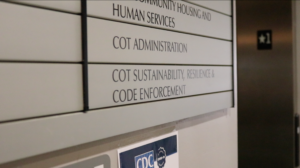
Code enforcement is designed to keep the community vibrant and well, employing the codes and ordinances of the city of Tallahassee.
However, there’s often a negative stigma that follows the words “code enforcement,” especially with tenants.
Most residents know that in order to avoid fees and court appearances, property compliance is important. However, some may not care, simply because they believe such agencies only want to create more citations to bring revenue to the city.
Or in some cases, homeowners may not be able to afford the costs to maintain their property.
James Payne, Tallahassee’s supervisor of code enforcement, wants to help residents understand that they are not “the enemy.” For years, he has heard from residents and homeowners that all code enforcement does is harass them by leaving a trail of notices in the mail, to phone calls, to in-person visits, while citations are written. Sometimes, homeowners say, the citations seem meaningless or unnecessary for the time it took to be documented.
Payne says they are just the opposite of that. “We want residents to know we are here to help. We really try to develop a relationship with the community by communicating more, rather than showing up at a property, writing a citation, and leaving.”
To combat the negative connotation, the city created the Tax and Lien Amnesty Program. This program provides a forgiveness of fines and/or liens on backlogged cases that have already gone to a code board prior to June 17, 2020, if an attempt has been made to clear that violation. This gives Tallahassee property owners motivation to make some effort with existing problems. Introduced in April 2020, the program was made to last about three months for the year 2021, but the city gave an extension with no set deadline. Some homeowners and landlords say it has worked in their favor.
Property owner Antonio Clements, says that in most neighborhoods it’s just a matter of talking with code enforcement officers.
“The more you develop a relationship with the officers, the better your situation would be,” Clements said. “As long as you are making an effort to correct a violation, they will work with you.”
Clements added that the number of active cases compared to last year is about the same, which can be taken positively as there are more attempts by residents to stay in compliance.
A number or ordinances have changed within the last year. Residents are no longer allowed to make an anonymous phone call about a violation, as some cases were found frivolous. An example – calling code enforcement about a dirty car that has been sitting in a parking lot for some time – is not considered grounds for a citation. In order for one to be made, the car would need to have a missing license plate, or a tire missing, or an expired registration tag, Powell said.
The City of Tallahassee Code Enforcement says it wants property owners and residents to know that their job is to help properties stay compliant with ordinances, with no intention to intimidate.